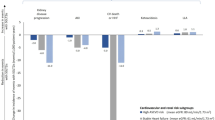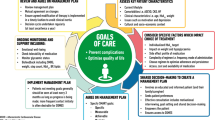Abstract
Aims
To examine the efficacy and safety of dapagliflozin in the treatment of hyperglycemia in cardiac surgery patients with type 2 diabetes (T2D).
Methods
Cardiac surgery patients with T2D (n = 250) were randomly assigned (1:1) to receive dapagliflozin plus basal-bolus insulin (DAPA group) or basal-bolus insulin alone (INSULIN group) in the early postoperative period. The primary outcome was mean difference in daily blood glucose (BG) concentrations between groups. The major safety outcomes were the occurrence of severe ketonemia/diabetic ketoacidosis (DKA) and hypoglycemia. All analyses were performed according to the intention-to-treat principle.
Results
The median age of the patients was 61 years (range, 55–61), and 219 (87.6%) were men. Overall, the randomization blood glucose was 165 mg/dL (SD, 37) and glycated hemoglobin was 7.7% (SD, 1.4). There were no differences in mean daily BG concentrations (149 vs. 150 mg/dL), mean percentage of readings within target BG of 70–180 mg/dL (82.7% vs. 82.5%), total daily insulin dose (mean, 39 vs. 40 units/day), number of daily insulin injections (median, 3.9 vs. 4), length of hospital stay (median, 10 vs. 10 days), or hospital complications (21.6% vs. 24.8%) between the DAPA and INSULIN groups. The mean plasma ketone levels were significantly higher in the DAPA group than in the INSULIN group at day 3 (0.71 vs. 0.30 mmol/L) and day 5 (0.42 vs. 0.19 mmol/L) of randomization. Six patients in the DAPA group developed severe ketonemia, but no patient developed DKA. There were no differences in the proportion of patients with BG < 70 mg/dL (9.6% vs. 7.2%) between the two groups.
Conclusion
Dapagliflozin complementary to basal-bolus insulin does not improve glycemia further over and above the basal-bolus insulin alone in hospitalized cardiac surgery patients. Dapagliflozin significantly increases plasma ketones levels. Safety of dapagliflozin in hospitalized patients needs further investigation.
Trial registration ClinicalTrials.gov NCT05457933.


Similar content being viewed by others
Data availability
The dataset for the current study is available on reasonable request by contacting MSK.
References
Umpierrez GE, Smiley D, Zisman A et al (2007) Randomized study of basal-bolus insulin therapy in the inpatient management of patients with type 2 diabetes (RABBIT 2 trial). Diabetes Care 30(9):2181–2186
Umpierrez GE, Smiley D, Jacobs S et al (2011) Randomized study of basal-bolus insulin therapy in the inpatient management of patients with type 2 diabetes undergoing general surgery (RABBIT 2 surgery). Diabetes Care 34(2):256–261
Pasquel FJ, Gianchandani R, Rubin DJ et al (2017) Efficacy of sitagliptin for the hospital management of general medicine and surgery patients with type 2 diabetes (Sita-Hospital): a multicentre, prospective, open-label, non-inferiority randomised trial. Lancet Diabetes Endocrinol 5(2):125–133
Vellanki P, Rasouli N, Baldwin D et al (2019) Glycaemic efficacy and safety of linagliptin compared to a basal-bolus insulin regimen in patients with type 2 diabetes undergoing non-cardiac surgery: a multicentre randomized clinical trial. Diabetes Obes Metab 21(4):837–843
Pérez-Belmonte LM, Osuna-Sánchez J, Millán-Gómez M et al (2019) Glycaemic efficacy and safety of linagliptin for the management of non-cardiac surgery patients with type 2 diabetes in a real-world setting: Lina-Surg study. Ann Med 51(3–4):252–261
Pérez-Belmonte LM, Osuna-Sánchez J, Rico-Robles JI, Ricci M, Lara JP, Gómez-Huelgas R (2022) Simplified glycaemic management for patients with type 2 diabetes admitted for acute decompensated heart failure using linagliptin. Med Clin (Barc) 158(4):173–177
Kuchay MS, Farooqui KJ, Mishra SK, Mithal A (2021) Glucose lowering efficacy and pleiotropic effects of sodium-glucose cotransporter 2 inhibitors. Adv Exp Med Biol 1307:213–230
Voors AA, Angermann CE, Teerlink JR et al (2022) The SGLT2 inhibitor empagliflozin in patients hospitalized for acute heart failure: a multinational randomized trial. Nat Med 28(3):568–574
Cunningham JW, Vaduganathan M, Claggett BL et al (2022) Dapagliflozin in patients recently hospitalized with heart failure and mildly reduced or preserved ejection fraction. J Am Coll Cardiol 80(14):1302–1310
Bansal B, Mithal A, Carvalho P, Mehta Y, Trehan N (2014) Medanta insulin protocols in patients undergoing cardiac surgery. Indian J Endocrinol Metab 18(4):455–467
International Hypoglycaemia Study Group (2017) Glucose concentrations of less than 3.0 mmol/L (54 mg/dL) should be reported in clinical trials: a joint position statement of the American diabetes association and the European association for the study of diabetes. Diabetes Care 40(1):155–157
Battelino T, Danne T, Bergenstal RM et al (2019) Clinical targets for continuous glucose monitoring data interpretation: recommendations from the international consensus on time in range. Diabetes Care 42(8):1593–1603
Mehta RL, Kellum JA, Shah SV et al (2007) Acute kidney injury network: report of an initiative to improve outcomes in acute kidney injury. Crit Care 11(2):31
Bano T, Mishra SK, Kuchay MS et al (2019) Continuation of metformin till night before surgery and lactate levels in patients undergoing coronary artery bypass graft surgery. Indian J Endocrinol Metab 23(4):416–421
Bano T, Kuchay MS, Mishra SK et al (2020) Immediate postoperative complications following coronary artery bypass grafting in patients with type 2 diabetes: a prospective cohort study. Diabetes Metab Syndr 14(1):47–51
Umpierrez GE, Smiley D, Hermayer K et al (2013) Randomized study comparing a Basal-bolus with a basal plus correction insulin regimen for the hospital management of medical and surgical patients with type 2 diabetes: basal plus trial. Diabetes Care 36(8):2169–2174
Kuchay MS, Mathew A, Mishra M et al (2023) Efficacy and safety of degludec U100 versus glargine U300 for the early postoperative management of patients with type 2 diabetes mellitus undergoing coronary artery bypass graft surgery: a non-inferiority randomized trial. Diabet Med 40(1):e15002
Galindo RJ, Pasquel FJ, Vellanki P et al (2022) A randomized controlled trial comparing insulin degludec U100 and glargine U100 for the inpatient management of patients with type 2 diabetes. Diabetes Obes Metab 24(1):42–49
Gerards MC, Venema GE, Patberg KW et al (2018) Dapagliflozin for prednisone-induced hyperglycaemia in acute exacerbation of chronic obstructive pulmonary disease. Diabetes Obes Metab 20(5):1306–1310
Okoroike H, Patel S, Simone P, Lavelle R, Szwak JA (2023) Impact of inpatient initiation of sodium-glucose cotransporter-2 inhibitors on prescription rates in patients with heart failure with reduced ejection fraction. Am J Cardiol 186:150–155
Handelsman Y, Henry RR, Bloomgarden ZT et al (2016) American association of clinical endocrinologists and American college of endocrinology position statement on the association of SGLT-2 inhibitors and diabetic ketoacidosis. Endocr Pract 22(6):753–762
Thiruvenkatarajan V, Meyer EJ, Nanjappa N, Van Wijk RM, Jesudason D (2019) Perioperative diabetic ketoacidosis associated with sodium-glucose co-transporter-2 inhibitors: a systematic review. Br J Anaesth 123(1):27–36
Kuchay MS, Mishra SK, Mehta Y (2021) Empagliflozin induced euglycemic diabetic ketoacidosis in a patient undergoing coronary artery bypass graft despite discontinuation of the drug 48 hours prior to the surgery. Diabetes Metab Syndr 15(3):909–911
Kosiborod MN, Esterline R, Furtado RHM et al (2021) Dapagliflozin in patients with cardiometabolic risk factors hospitalised with COVID-19 (DARE-19): a randomised, double-blind, placebo-controlled, phase 3 trial. Lancet Diabetes Endocrinol 9(9):586–594
Damman K, Beusekamp JC, Boorsma EM et al (2020) Randomized, double-blind, placebo-controlled, multicentre pilot study on the effects of empagliflozin on clinical outcomes in patients with acute decompensated heart failure (EMPA-RESPONSE-AHF). Eur J Heart Fail 22(4):713–722
Acknowledgements
We want to thank Surender Rao and Manish Kumar (research coordinators, Division of Endocrinology and Diabetes, Medanta-The Medicity Hospital, Gurugram, India) for their help in conducting the study. We also want to thank the Diabetes and Endocrinology Foundation (DEF), India for providing a grant for this study.
Funding
The current study was supported by an investigator-initiated study grant to MSK by the Diabetes and Endocrinology Foundation (DEF), Gurugram, India. The funding agency did not have any role in the design and conduct of the study; collection, management, analysis, or interpretation of the data; or preparation, review, or approval of the manuscript.
Author information
Authors and Affiliations
Contributions
MSK was responsible for the study concept and design, data collection, interpretation of data, drafting of the manuscript, and approval of the final submission. MSK, SKM, PK, MM, AS, CK, and PK contributed to the data collection, insulin dose management, CGM application, and approval of the final submission. MKS and PS contributed to the statistical analysis, critical revision of the manuscript, and approval of the final submission. PK, JSW, HKG, GB, VR, SS and RJ contributed to the data collection, critical revision of the manuscript, and approval of the final submission. MSK is the guarantor of this work and, as such, had full access to all the data in the study and takes responsibility for the integrity of the data and the accuracy of the data analysis. MSK has received speaker honoraria from Boehringer-Ingelheim, Novartis India, Sanofi, Novo Nordisk, Intas Pharmaceuticals Ltd, Sun Pharmaceutical Industries Ltd, USV Private Limited, and MSD Life Sciences Foundation. PK has received speaker honoraria from Novo Nordisk, Boehringer Ingelheim, and Sanofi. HKG has received speaker and consultant fees from Novo Nordisk and Sanofi. JSW has received speaker honoraria from Abbott India Limited, Novartis, AstraZeneca, and Sanofi. RJ has received speaker honoraria from Sanofi, Novartis, Intas Pharmaceuticals, and Lupin Limited. SKM has received speaker honoraria from Novo Nordisk, Boehringer Ingelheim, Novartis, Sanofi, Lupin Limited and Abbott India Limited.
Corresponding author
Ethics declarations
Conflict of interests
No other conflicts of interest relevant to this article were reported
Ethics approval and consent to participate
The study protocol and informed consent form were approved by the Institutional Review Board and the Ethics Committee.
Informed consent
Written informed consent was obtained from all study participants in accordance with the guidelines of the Declaration of Helsinki.
Additional information
Managed by Antonio Secchi.
Publisher's Note
Springer Nature remains neutral with regard to jurisdictional claims in published maps and institutional affiliations.
Supplementary Information
Below is the link to the electronic supplementary material.
Rights and permissions
Springer Nature or its licensor (e.g. a society or other partner) holds exclusive rights to this article under a publishing agreement with the author(s) or other rightsholder(s); author self-archiving of the accepted manuscript version of this article is solely governed by the terms of such publishing agreement and applicable law.
About this article
Cite this article
Kuchay, M.S., Khatana, P., Mishra, M. et al. Dapagliflozin for inpatient hyperglycemia in cardiac surgery patients with type 2 diabetes: randomised controlled trial (Dapa-Hospital trial). Acta Diabetol 60, 1481–1490 (2023). https://doi.org/10.1007/s00592-023-02138-4
Received:
Accepted:
Published:
Issue Date:
DOI: https://doi.org/10.1007/s00592-023-02138-4




